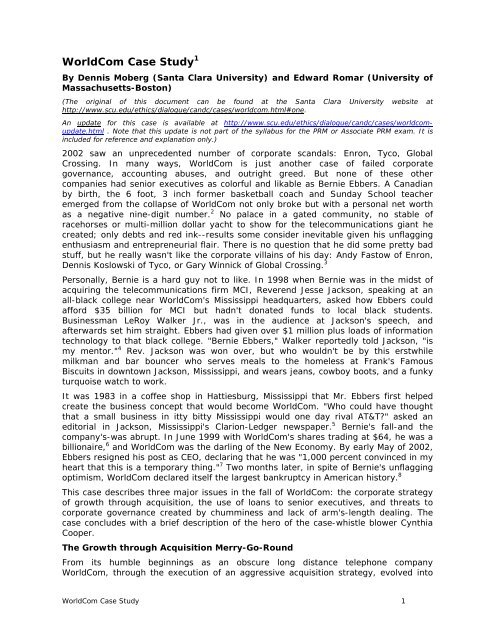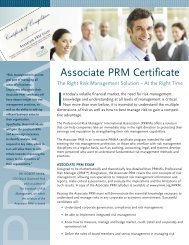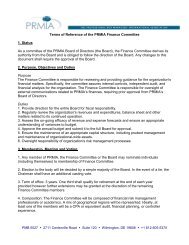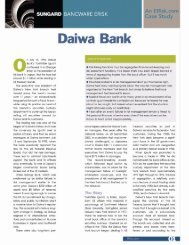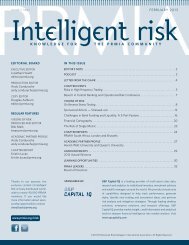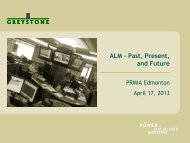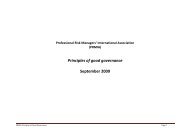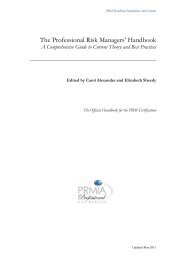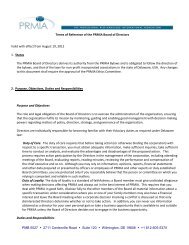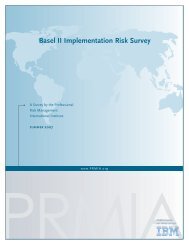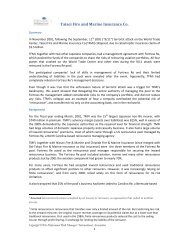WorldCom Case Study1 - PRMIA
WorldCom Case Study1 - PRMIA
WorldCom Case Study1 - PRMIA
Create successful ePaper yourself
Turn your PDF publications into a flip-book with our unique Google optimized e-Paper software.
<strong>WorldCom</strong> <strong>Case</strong> Study 1<br />
By Dennis Moberg (Santa Clara University) and Edward Romar (University of<br />
Massachusetts-Boston)<br />
(The original of this document can be found at the Santa Clara University website at<br />
http://www.scu.edu/ethics/dialogue/candc/cases/worldcom.html#one.<br />
An update for this case is available at http://www.scu.edu/ethics/dialogue/candc/cases/worldcomupdate.html<br />
. Note that this update is not part of the syllabus for the PRM or Associate PRM exam. It is<br />
included for reference and explanation only.)<br />
2002 saw an unprecedented number of corporate scandals: Enron, Tyco, Global<br />
Crossing. In many ways, <strong>WorldCom</strong> is just another case of failed corporate<br />
governance, accounting abuses, and outright greed. But none of these other<br />
companies had senior executives as colorful and likable as Bernie Ebbers. A Canadian<br />
by birth, the 6 foot, 3 inch former basketball coach and Sunday School teacher<br />
emerged from the collapse of <strong>WorldCom</strong> not only broke but with a personal net worth<br />
as a negative nine-digit number. 2 No palace in a gated community, no stable of<br />
racehorses or multi-million dollar yacht to show for the telecommunications giant he<br />
created; only debts and red ink--results some consider inevitable given his unflagging<br />
enthusiasm and entrepreneurial flair. There is no question that he did some pretty bad<br />
stuff, but he really wasn't like the corporate villains of his day: Andy Fastow of Enron,<br />
Dennis Koslowski of Tyco, or Gary Winnick of Global Crossing. 3<br />
Personally, Bernie is a hard guy not to like. In 1998 when Bernie was in the midst of<br />
acquiring the telecommunications firm MCI, Reverend Jesse Jackson, speaking at an<br />
all-black college near <strong>WorldCom</strong>'s Mississippi headquarters, asked how Ebbers could<br />
afford $35 billion for MCI but hadn't donated funds to local black students.<br />
Businessman LeRoy Walker Jr., was in the audience at Jackson's speech, and<br />
afterwards set him straight. Ebbers had given over $1 million plus loads of information<br />
technology to that black college. "Bernie Ebbers," Walker reportedly told Jackson, "is<br />
my mentor." 4 Rev. Jackson was won over, but who wouldn't be by this erstwhile<br />
milkman and bar bouncer who serves meals to the homeless at Frank's Famous<br />
Biscuits in downtown Jackson, Mississippi, and wears jeans, cowboy boots, and a funky<br />
turquoise watch to work.<br />
It was 1983 in a coffee shop in Hattiesburg, Mississippi that Mr. Ebbers first helped<br />
create the business concept that would become <strong>WorldCom</strong>. "Who could have thought<br />
that a small business in itty bitty Mississippi would one day rival AT&T?" asked an<br />
editorial in Jackson, Mississippi's Clarion-Ledger newspaper. 5 Bernie's fall-and the<br />
company's-was abrupt. In June 1999 with <strong>WorldCom</strong>'s shares trading at $64, he was a<br />
billionaire, 6 and <strong>WorldCom</strong> was the darling of the New Economy. By early May of 2002,<br />
Ebbers resigned his post as CEO, declaring that he was "1,000 percent convinced in my<br />
heart that this is a temporary thing." 7 Two months later, in spite of Bernie's unflagging<br />
optimism, <strong>WorldCom</strong> declared itself the largest bankruptcy in American history. 8<br />
This case describes three major issues in the fall of <strong>WorldCom</strong>: the corporate strategy<br />
of growth through acquisition, the use of loans to senior executives, and threats to<br />
corporate governance created by chumminess and lack of arm's-length dealing. The<br />
case concludes with a brief description of the hero of the case-whistle blower Cynthia<br />
Cooper.<br />
The Growth through Acquisition Merry-Go-Round<br />
From its humble beginnings as an obscure long distance telephone company<br />
<strong>WorldCom</strong>, through the execution of an aggressive acquisition strategy, evolved into<br />
<strong>WorldCom</strong> <strong>Case</strong> Study 1
the second-largest long distance telephone company in the United States and one of<br />
the largest companies handling worldwide Internet data traffic. 9 According to the<br />
<strong>WorldCom</strong> Web site, at its high point, the company<br />
• Provided mission-critical communications services for tens of thousands of<br />
businesses around the world<br />
• Carried more international voice traffic than any other company<br />
• Carried a significant amount of the world's Internet traffic<br />
• Owned and operated a global IP (Internet Protocol) backbone that provided<br />
connectivity in more than 2,600 cities and in more than 100 countries<br />
• Owned and operated 75 data centers on five continents. [Data centers provide<br />
hosting and allocation services to businesses for their mission-critical business<br />
computer applications.] 10<br />
<strong>WorldCom</strong> achieved its position as a significant player in the telecommunications<br />
industry through the successful completion of 65 acquisitions. 11 Between 1991 and<br />
1997, <strong>WorldCom</strong> spent almost $60 billion in the acquisition of many of these<br />
companies and accumulated $41 billion in debt. 12 Two of these acquisitions were<br />
particularly significant. The MFS Communications acquisition enabled <strong>WorldCom</strong> to<br />
obtain UUNet, a major supplier of Internet services to business, and MCI<br />
Communications gave <strong>WorldCom</strong> one of the largest providers of business and<br />
consumer telephone service. By 1997, <strong>WorldCom</strong>'s stock had risen from pennies per<br />
share to over $60 a share. 13 Through what appeared to be a prescient and successful<br />
business strategy at the height of the Internet boom, <strong>WorldCom</strong> became a darling of<br />
Wall Street. In the heady days of the technology bubble Wall Street took notice of<br />
<strong>WorldCom</strong> and its then visionary CEO, Bernie Ebbers. This was a company "on the<br />
move," and Wall Street investment banks, analysts and brokers began to discover<br />
<strong>WorldCom</strong>'s value and make "strong buy recommendations" to investors.<br />
As this process began to unfold, the analysts' recommendations, coupled with the<br />
continued rise of the stock market, made <strong>WorldCom</strong> stock desirable, and the market's<br />
view of the stock was that it could only go up. As the stock value went up, it was easier<br />
for <strong>WorldCom</strong> to use stock as the vehicle to continue to purchase additional companies.<br />
The acquisition of MFS Communications and MCI Communications were, perhaps, the<br />
most significant in the long list of <strong>WorldCom</strong> acquisitions. With the acquisition of MFS<br />
Communications and its UUNet unit, "<strong>WorldCom</strong> (s)uddenly had an investment story to<br />
offer about the value of combining long distance, local service and data<br />
communications." 14 In late 1997, British Telecommunications Corporation made a $19<br />
billion bid for MCI. Very quickly, Ebbers made a counter offer of $30 billion in<br />
<strong>WorldCom</strong> stock. In addition, Ebbers agreed to assume $5 billion in MCI debt, making<br />
the deal $35 billion or 1.8 times the value of the British Telecom offer. MCI took<br />
<strong>WorldCom</strong>'s offer making <strong>WorldCom</strong> a truly significant global telecommunications<br />
company. 15<br />
All this would be just another story of a successful growth strategy if it weren't for one<br />
significant business reality--mergers and acquisitions, especially large ones, present<br />
significant managerial challenges in at least two areas. First, management must deal<br />
with the challenge of integrating new and old organizations into a single smoothly<br />
functioning business. This is a time-consuming process that involves thoughtful<br />
planning and considerable senior managerial attention if the acquisition process is to<br />
increase the value of the firm to both shareholders and stakeholders. With 65<br />
acquisitions in six years and several of them large ones, <strong>WorldCom</strong> management had a<br />
<strong>WorldCom</strong> <strong>Case</strong> Study 2
great deal on their plate. The second challenge is the requirement to account for the<br />
financial aspects of the acquisition. The complete financial integration of the acquired<br />
company must be accomplished, including an accounting of assets, debts, good will<br />
and a host of other financially important factors. This must be accomplished through<br />
the application of generally accepted accounting practices (GAAP).<br />
<strong>WorldCom</strong>'s efforts to integrate MCI illustrate several areas senior management did not<br />
address well. In the first place, Ebbers appeared to be an indifferent executive who<br />
"paid scant attention to the details of operations." 16 ; For example, customer service<br />
deteriorated. One business customer's service was discontinued incorrectly, and when<br />
the customer contacted customer service, he was told he was not a customer.<br />
Ultimately, the <strong>WorldCom</strong> representative told him that if he was a customer, he had<br />
called the wrong office because the office he called only handled MCI accounts. 17 This<br />
poor customer stumbled "across a problem stemming from <strong>WorldCom</strong>'s acquisition<br />
binge: For all its talent in buying competitors, the company was not up to the task of<br />
merging them. Dozens of conflicting computer systems remained, local systems were<br />
repetitive and failed to work together properly, and billing systems were not<br />
coordinated." 18<br />
Poor integration of acquired companies also resulted in numerous organizational<br />
problems. Among them were:<br />
• Senior management made little effort to develop a cooperative mindset among<br />
the various units of <strong>WorldCom</strong>.<br />
• Inter-unit struggles were allowed to undermine the development of a unified<br />
service delivery network.<br />
• <strong>WorldCom</strong> closed three important MCI technical service centers that contributed<br />
to network maintenance only to open twelve different centers that, in the words<br />
of one engineer, were duplicate and inefficient.<br />
• Competitive local exchange carriers (Clercs) were another managerial nightmare.<br />
<strong>WorldCom</strong> purchased a large number of these to provide local service. According<br />
to one executive, "the <strong>WorldCom</strong> model was a vast wasteland of Clercs, and all<br />
capacity was expensive and very underutilized. There was far too much<br />
redundancy, and we paid far too much to get it." 19<br />
Regarding financial reporting, <strong>WorldCom</strong> used a liberal interpretation of accounting<br />
rules when preparing financial statements. In an effort to make it appear that profits<br />
were increasing, <strong>WorldCom</strong> would write down in one quarter millions of dollars in<br />
assets it acquired while, at the same time, it "included in this charge against earnings<br />
the cost of company expenses expected in the future. The result was bigger losses in<br />
the current quarter but smaller ones in future quarters, so that its profit picture would<br />
seem to be improving." 20 The acquisition of MCI gave <strong>WorldCom</strong> another accounting<br />
opportunity. While reducing the book value of some MCI assets by several billion<br />
dollars, the company increased the value of "good will," that is, intangible assets-a<br />
brand name, for example-by the same amount. This enabled <strong>WorldCom</strong> each year to<br />
charge a smaller amount against earnings by spreading these large expenses over<br />
decades rather than years. The net result was <strong>WorldCom</strong>'s ability to cut annual<br />
expenses, acknowledge all MCI revenue and boost profits from the acquisition.<br />
<strong>WorldCom</strong> managers also tweaked their assumptions about accounts receivables, the<br />
amount of money customers owe the company. For a considerable time period,<br />
management chose to ignore credit department lists of customers who had not paid<br />
their bills and were unlikely to do so. In this area, managerial assumptions play two<br />
<strong>WorldCom</strong> <strong>Case</strong> Study 3
important roles in receivables accounting. In the first place, they contribute to the<br />
amount of funds reserved to cover bad debts. The lower the assumption of noncollectable<br />
bills, the smaller the reserve fund required. The result is higher earnings.<br />
Secondly, if a company sells receivables to a third party, which <strong>WorldCom</strong> did, then the<br />
assumptions contribute to the amount or receivables available for sale. 21<br />
So long as there were acquisition targets available, the merry-go-round kept turning,<br />
and <strong>WorldCom</strong> could continue these practices. The stock price was high, and<br />
accounting practices allowed the company to maximize the financial advantages of the<br />
acquisitions while minimizing the negative aspects. <strong>WorldCom</strong> and Wall Street could<br />
ignore the consolidation issues because the new acquisitions allowed management to<br />
focus on the behavior so welcome by everyone, the continued rise in the share price.<br />
All this was put in jeopardy when, in 2000, the government refused to allow<br />
<strong>WorldCom</strong>'s acquisition of Sprint. The denial stopped the carousel, put an end to<br />
<strong>WorldCom</strong>'s acquisition-without-consolidation strategy and left management a stark<br />
choice between focusing on creating value from the previous acquisitions with the<br />
possible loss of share value or trying to find other creative ways to sustain and<br />
increase the share price.<br />
In July 2002, <strong>WorldCom</strong> filed for bankruptcy protection after several disclosures<br />
regarding accounting irregularities. Among them was the admission of improperly<br />
accounting for operating expenses as capital expenses in violation of generally<br />
accepted accounting practices (GAAP). <strong>WorldCom</strong> has admitted to a $9 billion<br />
adjustment for the period from 1999 thorough the first quarter of 2002.<br />
Sweetheart Loans To Senior Executives<br />
Bernie Ebbers' passion for his corporate creation loaded him up on common stock.<br />
Through generous stock options and purchases, Ebbers' <strong>WorldCom</strong> holdings grew and<br />
grew, and he typically financed these purchases with his existing holdings as collateral.<br />
This was not a problem until the value of <strong>WorldCom</strong> stock declined, and Bernie faced<br />
margin calls (a demand to put up more collateral for outstanding loans) on some of his<br />
purchases. At that point he faced a difficult dilemma. Because his personal assets were<br />
insufficient to meet the call, he could either sell some of his common shares to finance<br />
the margin calls or request a loan from the company to cover the calls. Yet, when the<br />
board learned of his problem, it refused to let him sell his shares on the grounds that it<br />
would depress the stock price and signal a lack of confidence about <strong>WorldCom</strong>'s<br />
future. 22<br />
Had he pressed the matter and sold his stock, he would have escaped the bankruptcy<br />
financially whole, but Ebbers honestly thought <strong>WorldCom</strong> would recover. Thus, it was<br />
enthusiasm and not greed that trapped Mr. Ebbers. The executives associated with<br />
other corporate scandals sold at the top. In fact, other <strong>WorldCom</strong> executives did much,<br />
much better than Ebbers did. 23 Bernie borrowed against his stock. That course of action<br />
makes sense if you believe the stock will go up, but it's the road to ruin if the stock<br />
goes down. Unlike the others, he intended to make himself rich taking the rest of the<br />
shareholders with him. In his entire career, Mr. Ebbers sold company shares only half a<br />
dozen times. Detractors may find him irascible and arrogant, but defenders describe<br />
him as a principled man. 24<br />
The policy of boards of directors authorizing loans for senior executives raises<br />
eyebrows. The sheer magnitude of the loans to Ebbers was breathtaking. The $341<br />
million loan the board granted Mr. Ebbers is the largest amount any publicly traded<br />
company has lent to one of its officers in recent memory. 25 Beyond that, some question<br />
whether such loans are ethical. "A large loan to a senior executive epitomizes concerns<br />
<strong>WorldCom</strong> <strong>Case</strong> Study 4
about conflict of interest and breach of fiduciary duty," said former SEC enforcement<br />
official Seth Taube. 26 Nevertheless, 27percent of major publicly traded companies had<br />
loans outstanding for executive officers in 2000 up from 17percent in 1998 (most<br />
commonly for stock purchase but also home buying and relocation). Moreover, there is<br />
the claim that executive loans are commonly sweetheart deals involving interest rates<br />
that constitute a poor return on company assets. <strong>WorldCom</strong> charged Ebbers slightly<br />
more than 2percent interest, a rate considerably below that available to "average"<br />
borrowers and also below the company's marginal rate of return. Considering such<br />
factors, one compensation analyst claims that such lending "should not be part of the<br />
general pay scheme of perks for executives. I just think it's the wrong thing to do." 27<br />
What's a Nod or Wink Among Friends?<br />
In the autumn of 1998, Securities and Exchange Commission Chairman Arthur Levitt<br />
Jr. uttered the prescient criticism, "Auditors and analysts are participants in a game of<br />
nods and winks." 28 It should come as no surprise that it was Arthur Andersen that<br />
endorsed many of the accounting irregularities that contributed to <strong>WorldCom</strong>'s<br />
demise. 29 Beyond that, however, were a host of incredibly chummy relationships<br />
between <strong>WorldCom</strong>'s management and Wall Street analysts.<br />
Since the Glass-Steagall Act was repealed in 1999, financial institutions have been free<br />
to offer an almost limitless range of financial services to their commercial and<br />
investment clients. Citigroup, the result of the merger of Citibank and Travelers<br />
Insurance Company, which owned the investment bank and brokerage firm Solomon<br />
Smith Barney, was an early beneficiary of investment deregulation. Citibank regularly<br />
dispensed cheap loans and lines of credit as a means of attracting and rewarding<br />
corporate clients for highly lucrative work in mergers and acquisitions. Since <strong>WorldCom</strong><br />
was so active in that mode, their senior managers were the targets of a great deal of<br />
influence peddling by their banker, Citibank. For example, Travelers Insurance, a<br />
Citigroup unit, lent $134 million to a timber company Bernie Ebbers was heavily<br />
invested in. Eight months later, <strong>WorldCom</strong> chose Salomon Smith Barney, Citigroup's<br />
brokerage unit, to be the lead underwriter of $5 billion of its bond issue. 30<br />
But the entanglements went both ways. Since the loan to Ebbers was collateralized by<br />
his equity holdings, Citigroup had reason to prop up <strong>WorldCom</strong> stock. And no one was<br />
better at that than Jack Grubman, Salomon Smith Barney's telecommunication analyst.<br />
Grubman first met Bernie Ebbers in the early 1990s when he was heading up the<br />
precursor to <strong>WorldCom</strong>, LDDS Communications. The two hit it off socially, and<br />
Grubman started hyping the company. Investors were handsomely rewarded for<br />
following Grubman's buy recommendations until stock reached its high, and Grubman<br />
rose financially and by reputation. In fact, Institutional Investing magazine gave Jack a<br />
Number 1 ranking in 1999, 31 and Business Week labeled him "one of the most powerful<br />
players on Wall Street. 32<br />
The investor community has always been ambivalent about the relationship between<br />
analysts and the companies they analyze. As long as analyst recommendations are<br />
correct, close relations have a positive insider quality, but when their recommendations<br />
turn sour, corruption is suspected. Certainly Grubman did everything he could to tout<br />
his personal relationship with Bernie Ebbers. He bragged about attending Bernie's<br />
wedding in 1999. He attended board meeting at <strong>WorldCom</strong>'s headquarters. Analysts at<br />
competing firms were annoyed with this chumminess. While the other analysts strained<br />
to glimpse any tidbit of information from the company's conference call, Grubman<br />
would monopolize the conversation with comments about "dinner last night." 33<br />
<strong>WorldCom</strong> <strong>Case</strong> Study 5
It is not known who picked up the tab for such dinners, but Grubman certainly<br />
rewarded executives for their close relationship with him. 34 Both Ebbers and <strong>WorldCom</strong><br />
CFO Scott Sullivan were granted privileged allocations in IPO (Initial Public Offering)<br />
auctions. While the Securities and Exchange Commission allows underwriters like<br />
Salomon Smith Barney to distribute their allotment of new securities as they see fit<br />
among their customers, this sort of favoritism has angered many small investors.<br />
Banks defend this practice by contending that providing high-net-worth individuals with<br />
favored access to hot IPOs is just good business. 35 Alternatively, they allege that<br />
greasing the palms of distinguished investors creates a marketing "buzz" around an<br />
IPO, helping deserving small companies trying to go public get the market attention<br />
they deserve. 36 For the record, Mr. Ebbers personally made $11 million in trading<br />
profits over a four-year period on shares from initial public offerings he received from<br />
Salomon Smith Barney. 37 In contrast, Mr. Sullivan lost $13,000 from IPOs, indicating<br />
that they were apparently not "sure things." 38<br />
There is little question but that friendly relations between Grubman and <strong>WorldCom</strong><br />
helped investors from 1995 to 1999. Many trusted Grubman's insider status and<br />
followed his rosy recommendations to financial success. In a 2000 profile in Business<br />
Week, he seemed to mock the ethical norm against conflict of interest: "What used to<br />
be a conflict is now a synergy," he said at the time. "Someone like me would have<br />
been looked at disdainfully by the buy side 15 years ago. Now they know that I'm in<br />
the flow of what's going on." 39 Yet, when the stock started cratering later that year,<br />
Grubman's enthusiasm for <strong>WorldCom</strong> persisted. Indeed, he maintained the highest<br />
rating on <strong>WorldCom</strong> until March 18, 2002, when he finally raised its risk rating. At that<br />
time, the stock had fallen almost 90 percent from its high two years before. Grubman's<br />
mea culpa to clients on April 22 read, "In retrospect the depth and length of the decline<br />
in enterprise spending has been stronger and more damaging to <strong>WorldCom</strong> than we<br />
even anticipated." 40 An official statement from Salomon Smith Barney two weeks later<br />
seemed to contradict the notion that Grubman's analysis was conflicted: "Mr. Grubman<br />
was not alone in his enthusiasm for the future prospects of the company. His coverage<br />
was based purely on information yielded during his analysis and was not based on<br />
personal relationships." 41 Right.<br />
On August 15, 2002, Jack Grubman resigned from Salomon where he had made as<br />
much as $20 million/year. His resignation letter read in part, "I understand the<br />
disappointment and anger felt by investors as a result of [the company's] collapse, I<br />
am nevertheless proud of the work I and the analysts who work with me did." 42 On<br />
December 19, 2002, Jack Grubman was fined $15 million and was banned from<br />
securities transactions for life by the Securities and Exchange Commission for such<br />
conflicts of interest.<br />
The media vilification that accompanies one's fall from power unearthed one interesting<br />
detail about Grubman's character-he repeated lied about his personal background. A<br />
graduate of Boston University, Mr. Grubman claimed a degree from MIT. Moreover, he<br />
claimed to have grown up in colorful South Boston, while his roots were actually in<br />
Boston's comparatively bland Oxford Circle neighborhood. 43 What makes a person fib<br />
about his personal history is an open question. As it turns out, this is probably the least<br />
of Jack Grubman's present worries. New York State Controller H. Carl McCall sued<br />
Citicorp, Arthur Andersen, Jack Grubman, and others for conflict of interest. According<br />
to Mr. McCall, "This is another case of corporate coziness costing investors billions of<br />
dollars and raising troubling questions about the integrity of the information investors<br />
receive." 44<br />
<strong>WorldCom</strong> <strong>Case</strong> Study 6
The Hero of the <strong>Case</strong><br />
No integrity questions can be raised about Cynthia Cooper whose careful detective<br />
work as an internal auditor at <strong>WorldCom</strong> exposed some of the accounting irregularities<br />
apparently intended to deceive investors. Originally assigned responsibilities in<br />
operational auditing, Cynthia and her colleagues grew suspicious of a number of<br />
peculiar financial transactions and went outside their assigned responsibilities to<br />
investigate. What they found was a series of clever manipulations intended to bury<br />
almost $4 billion in misallocated expenses and phony accounting entries. 45<br />
A native of Clinton, Mississippi, where <strong>WorldCom</strong>'s headquarters was located, Ms.<br />
Cooper conducted her detective work was in secret, often late at night to avoid<br />
suspicion. The thing that first aroused her curiosity came in March 2002 when a senior<br />
line manager complained to her that her boss, CFO Scott Sullivan, had usurped a $400<br />
million reserve account he had set aside as a hedge against anticipated revenue losses.<br />
That didn't seem kosher, so Cooper inquired of <strong>WorldCom</strong>'s accounting firm, Arthur<br />
Andersen. They brushed her off, and Ms. Cooper decided to press the matter with the<br />
board's audit committee. That put her in direct conflict with her boss, Sullivan, who<br />
ultimately backed down. The next day, however, he warned her to stay out of such<br />
matters.<br />
Undeterred and emboldened by the knowledge that Andersen had been discredited by<br />
the Enron case and that the SEC was investigating <strong>WorldCom</strong>, Cynthia decided to<br />
continue her investigation. Along the way, she learned of a <strong>WorldCom</strong> financial analyst<br />
who was fired a year earlier for failing to go along with accounting chicanery. 46<br />
Ultimately, she and her team uncovered a $2 billion accounting entry for capital<br />
expenditures that had never been authorized. It appeared that the company was<br />
attempting to represent operating costs as capital expenditures in order to make the<br />
company look more profitable. To gather further evidence, Cynthia's team began an<br />
unauthorized search through <strong>WorldCom</strong>'s computerized accounting information system.<br />
What they found was evidence that fraud was being committed. When Sullivan heard<br />
of the ongoing audit, he asked Cooper to delay her work until the third quarter. She<br />
bravely declined. She went to the board's audit committee and in June, Scott Sullivan<br />
and two others were terminated. What Ms. Cooper had discovered was the largest<br />
accounting fraud in U.S. history. 47<br />
As single-minded as Cynthia Cooper appeared during this entire affair, it was an<br />
incredibly trying ordeal. Her parents and friends noticed that she was under<br />
considerable stress and was losing weight. According to the Wall Street Journal, she<br />
and her colleagues worried "that their findings would be devastating to the company<br />
[and] whether their revelations would result in layoffs and obsessed about whether<br />
they were jumping to unwarranted conclusions that their colleagues at <strong>WorldCom</strong> were<br />
committing fraud. Plus, they feared that they would somehow end up being blamed for<br />
the mess." 48<br />
It is unclear at this writing whether Bernie Ebbers will be held responsible for the<br />
accounting irregularities that brought down his second in command. Jack Grubman's<br />
final legal fate is also unclear. While the ethical quality of enthusiasm and sociability<br />
are debatable, the virtue of courage is universally acclaimed, and Cynthia Cooper<br />
apparently has it. Thus, it was not surprising that on December 21, 2002, Cynthia<br />
Cooper was recognized as one of three "Persons of the Year" by Time magazine.<br />
Questions For Discussion<br />
1. What are the ethical considerations involved in a company's decision to loan<br />
executives money to cover margin calls on their purchase of shares of company stock?<br />
<strong>WorldCom</strong> <strong>Case</strong> Study 7
2. When well conceived and executed properly, a growth-through-acquisition strategy<br />
is an accepted method to grow a business. What went wrong at <strong>WorldCom</strong>? Is there a<br />
need to put in place protections to insure stakeholders benefit from this strategy? If so,<br />
what form should these protections take?<br />
3. What are the ethical pros and cons of a banking firm giving their special clients<br />
privileged standing in "hot" IPO auctions?<br />
4. Jack Grubman apparently lied in his official biography at Salomon Smith Barney.<br />
Isn't this simply part of the necessary role of marketing yourself? Is it useful to<br />
distinguish between "lying" and merely "fudging."?<br />
5. Cynthia Cooper and her colleagues worried about their revelations bringing down the<br />
company. Her boss, Scott Sullivan, asked her to delay reporting her findings for one<br />
quarter. She and her team did not know for certain whether this additional time period<br />
might have given Sullivan time to "save the company" from bankruptcy. Assume that<br />
you were a member of Cooper's team and role-play this decision-making situation.<br />
1 Copyright © 2003 by Dennis Moberg, Santa Clara University and Edward Romar, University of Massachusetts‐Boston.<br />
Reprinted with permission. This case was made possible by a Hackworth Faculty Research Grant from the Markkula<br />
Center for Applied Ethics, Santa Clara University.<br />
2 This is only true if he is liable for the loans he was given by <strong>WorldCom</strong>. If he avoids those somehow, his net worth may<br />
be plus $8.4 million according to the Wall Street Journal (see S. Pulliam & J. Sandberg [2002]. <strong>WorldCom</strong> Seeks SEC<br />
Accord As Report Claims Wider Fraud [November 5], A‐1).<br />
3 Colvin, G. (2002). Bernie Ebbers' Foolish Faith. Fortune, 146, (11 [November 25]), 52.<br />
4 Padgett, T., & Baughn, A. J. (2002). The Rise and Fall of Bernie Ebbers. Time, 159, (19 [May 12]), 56+.<br />
5 Padgett, T., & Baughn, A. J. (2002). The Rise and Fall of Bernie Ebbers. Time, 159, (19 [May 12]), 56+.<br />
6 Young, S., & Solomon, D. (2002). <strong>WorldCom</strong> Backs Chief Executive For $340 Million. Wall Street Journal (February 8),<br />
B‐1.<br />
7 Ibid.<br />
8 Romero, Simon, & Atlas, Rava D. (2002). <strong>WorldCom</strong>'s Collapse: The Overview. New York Times (July 22), A‐1<br />
9 Ibid.<br />
10 <strong>WorldCom</strong> website, (www.worldcom.com/global/about/facts/).<br />
11 Eichenwald, Kurt (2002). For <strong>WorldCom</strong>, Acquisitions Were Behind its Rise and Fall, New York Times (August 8), A‐1.<br />
12 Romero & Atlas, op. cit.<br />
13 Browning, E. S. (1997). Is the Praise for <strong>WorldCom</strong> Too Much? Wall Street Journal (October 8), p. C‐24. All acquisition<br />
amounts are taken from this article.<br />
14 Eichenwald, Op. cit., p. A‐3.<br />
15 Ibid.<br />
16 Ibid.<br />
17 Ibid.<br />
18 Ibid.<br />
19 Ibid.<br />
20 Ibid.<br />
21 Ibid., p. A‐5; Sender, Henry (2002), Inside the <strong>WorldCom</strong> Numbers Factory, Wall Street Journal (August 21), C‐1.<br />
22 Solomon, D., & Blumenstein, R. (2002). Telecom: Mississippi blues: Loans Proved to be Ebber's Downfall. Wall Street<br />
Journal (May 1), A‐8.<br />
23 According to David Leonhardt of the New York Times (8/25/02, p. 10), Director Francesco Galesi made $31 million,<br />
John Sidgmore, the senior manager who replaced Ebbers as CEO, made $25 million, and CFO Scott Sullivan, who many<br />
think was responsible for the accounting abuses at World Com, pocketed $23 million.<br />
24 According to David Leonhardt of the New York Times (8/25/02, p. 10), Director Francesco Galesi made $31 million,<br />
John Sidgmore, the senior manager who replaced Ebbers as CEO, made $25 million, and CFO Scott Sullivan, who many<br />
think was responsible for the accounting abuses at World Com, pocketed $23 million.<br />
25 Solomon, D., & Sandberg, J. (2002). Leading the News. Wall Street Journal (November 6). A‐3. Report that Bernie used<br />
8% of this load for personal use, an uncharacteristically self‐serving move for Mr. Ebbers.<br />
26 Young, S. (2002). Big <strong>WorldCom</strong> Loan May Have Spurred Inquiry. Wall Street Journal (March 14), A‐3.<br />
<strong>WorldCom</strong> <strong>Case</strong> Study 8
27<br />
Young, S. (2002). Big <strong>WorldCom</strong> Loan May Have Spurred Inquiry. Wall Street Journal (March 14), A‐3.<br />
28<br />
Byrne, J. A. (2002). Fall from grace: Joe Berardino Presided Over the Biggest Accounting Scandals Ever and the Demise<br />
of a Legendary Firm. Business Week (August 12), 50+.<br />
29<br />
These amounted to over $9 million in overstated income. For an explanation as to how some of this was done, see.<br />
Elstrom, P. (2002). How to Hide $3.8 billion in Expenses. Business Week (July 8), 41+.<br />
30<br />
Morgenson, G. (2002). More Clouds Over Citigroup in its Dealings with Ebbers. New York Times (November 3), 1.<br />
31<br />
Smith, R., & Solomon, D. (2002). Heard on the Street. Ebber's Exit Hurts <strong>WorldCom</strong>'s Biggest Fan. Wall Street Journal<br />
(May 3), C‐1.<br />
32 Rosenbush, S. (2002). Inside the Telecom Game. Business Week (August 5), p. 34+.<br />
33 Ibid.<br />
34 On December 20, 2002, Jack Grubman was fined $15 million and was banned for securities transactions for life by the<br />
Securities and Exchange Commission for such conflicts of interest.<br />
35 Editors. (2002). Citi Defends IPO Allocations to Shamed <strong>WorldCom</strong> Execs. Euroweek (August 30), 18.<br />
36 Murray, A. (2002). Political Capital: Let Capital Markets, Not Financial Firms, Govern Fate of IPOs. Wall Street Journal<br />
(September 10), A‐4<br />
37 Craig, S. (2002). Offerings Were Easy Money for Ebbers. Wall Street Journal (September 3), C‐1.<br />
38 Ibid.<br />
39 Rosenbush, op. cit., 34.<br />
40 Smith, op. cit., C‐1<br />
41 Ibid.<br />
42 Editors. (2002). Salomon's Jack Grubman Resigns. United Press International (August 15), 10082777w0186.<br />
43 Rosenbush, op. cit., 34.<br />
44 Weil, J. (2002). Leading the News: An Ebbers' Firm Got Citigroup loans. Wall Street Journal (October 14), A‐3.<br />
45 Pelliam, S. (2002). Questioning the Books: <strong>WorldCom</strong> Memos Suggest Plan to Bury Financial Misstatements. Wall<br />
Street Journal (July 9), A‐8.<br />
46 Orey, M. (2002). Career Journal: <strong>WorldCom</strong>‐Inspired 'Whistle‐Blower' Law has Weaknesses. Wall Street Journal<br />
(October 1), B‐1.<br />
47 Colvin, G. (2002). Wonder Women of Whistleblowing. Fortune (August 12), 56+.<br />
48 Pelliam, S., & Solomon, D. (2002). Uncooking the Books: How Three Unlikely Sleuths Discovered Fraud at <strong>WorldCom</strong>.<br />
Wall Street Journal (October 30), A‐1.<br />
<strong>WorldCom</strong> <strong>Case</strong> Study 9


